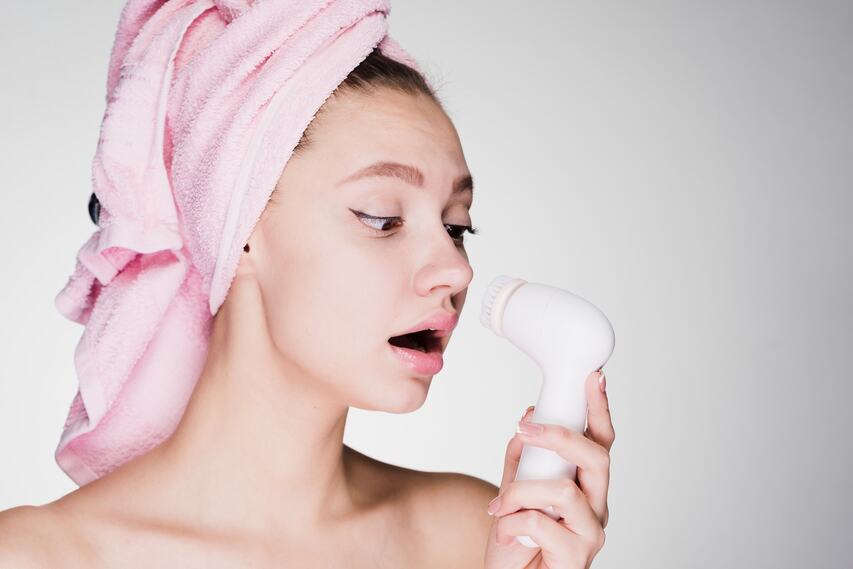Should you use an exfoliating spin brush for acne?

Ultrasonic and exfoliating facial cleansing brushes have surged in popularity as deep-cleansing skincare tools. Inspired by electric toothbrushes, many hope these brushes can transform their skincare routine. However, for those with acne-prone skin, these tools can carry potential risks. Here’s what you need to know about using facial cleansing brushes safely and alternative acne treatments.
Why Cleansing Brushes May Not Be Ideal for Acne-Prone Skin
Though these brushes promise thorough cleansing, they may lead to skin issues if used improperly or too often. Here are some concerns for acne-prone skin:
- Barrier Damage: Intense exfoliation can strip away the skin’s protective barrier, causing dryness, irritation, and inflammation—worsening acne.
- Overstimulation: Brushes with stiff bristles or aggressive movements can aggravate inflamed skin, triggering redness and irritation.
- Increased Oil Production: Frequent brushing can signal the skin to produce more oil, leading to further breakouts.
Safe Usage Tips for Cleansing Brushes on Acne-Prone Skin
If you still want to use a cleansing brush, these guidelines can help:
- Consider Acne Severity: Avoid using brushes if you have moderate to severe inflammatory acne, as they may be too harsh.
- Choose the Right Brush Head: Select a brush with soft, flexible bristles for sensitive skin, like the Clarisonic Acne Brush Head.
- Gentle Technique: Use light, circular motions to avoid pressing too hard.
- Limit Frequency: Restrict usage to once or twice a week to prevent over-exfoliation and oil imbalance.
- Maintain Hygiene: Rinse after each use and do a weekly deep clean by soaking in alcohol to prevent bacterial buildup.
Alternatives for Acne Treatment Without Brushes
Instead of relying on brushes, consider these gentler acne treatment methods:
- Medicated Cleansers: Opt for gentle acne-fighting cleansers with salicylic acid or benzoyl peroxide. They help clear pores and reduce bacteria. A good option is MDacne’s Hydrating Cleanser.
- Targeted Acne Creams: Use a targeted treatment cream to address breakouts without irritating the skin. Options include MDacne's 2% salicylic acid cream, 2.5% benzoyl peroxide, and sulfur-azelaic acid cream.
- Non-Comedogenic Moisturizer: Even oily skin needs hydration to maintain a healthy barrier. Choose a lightweight, oil-free moisturizer, like MDacne's Niacinamide Moisturizer, to avoid pore clogging.
FAQs
Are cleansing brushes suitable for all skin types?
These brushes can be too harsh for sensitive or acne-prone skin, increasing the risk of irritation and breakouts.
Can facial brushes clear acne on their own?
No. While they remove impurities, a well-rounded acne treatment that includes medicated cleansers and topical treatments is essential.
Is it safe to share a facial cleansing brush?
No, sharing brushes can spread bacteria. It’s best to keep a brush for personal use only.
Conclusion
While cleansing brushes may work for some, acne-prone skin requires a delicate approach. Overuse or rough bristles can harm the skin’s barrier and trigger breakouts. Following safe-use guidelines, maintaining brush hygiene, and considering gentler acne treatments can be more effective in managing acne. For the clearest skin, a balanced skincare routine tailored to your specific needs remains the best strategy.
Shop:
MDacne Hydrating cleanser
MDacne soothing moisturizer
MDacne salicylic acid 2% cream
MDacne Benzoyl peroxide 2.5% cream
MDacne Benzoyl peroxide 5% cream
MDacne Sulfur 3%/azelaic acid cream
To find the right acne treatments for your unique skin, take the free skin assessment by clicking here.



